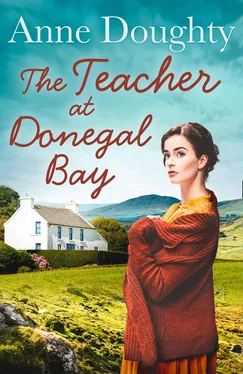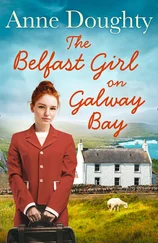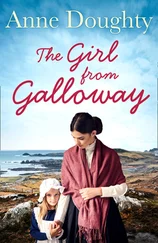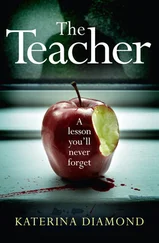1 ...7 8 9 11 12 13 ...17 ‘No, I’m nae tired at all,’ he said brightly.
She smiled at him and took up her work, knowing now that he was tired. And how would he not be tired with the jobs McTaggart gave him, and him not strong. She felt her eyes mist as she looked at him, twelve years old and trying to do a man’s work with a child’s body. ‘Away now an’ eat a bite, I left it ready for ye,’ she said quickly as she concealed the end of thread at the back of her work and trimmed it off neatly with her fine scissors.
‘Have ye had yourn?’ he asked, his eyes on her hands and the small practised movements she made as she picked up the next napkin and checked that the tracing was in the right place and on the proper side of the fabric.
‘Oh, long since,’ she laughed as she squinted into the light, moistened the white thread and manoeuvred it into the eye of the crewel needle.
He knew she hadn’t eaten, just as she had known that he was tired. But neither felt any shame in their deception. In the important things of their life, their love for the hard but beautiful place in which they lived, their joy in the creatures who shared their bare hillside, and the pleasure of the few books which had survived the struggle to make ends meet, they could be honest. There was between them both friendship and love.
The fire was not lit, though there was turf in the basket and kindling stacked in a corner by the wooden settle. No need of warmth on such a fine summer morning, but without fire there could be no cooking. The empty hearth told him that both the flour sack and the meal barrel were empty. Unless there were some dollars from Nellie in America or a postal order from Glasgow or London, they would remain so. The few shillings from the man who collected the white work would have to go on baker’s bread. And in June and July they had to buy potatoes till the new crop were ready to dig. In all the old stories they read on winter’s nights, July was the ‘hungry month’. As he bit into the dry crust of bread, Georgie wondered why it was only July, for June was just as bad.
Most mornings they had tea, made weak and brewed well over the fire, but he knew that there would be no more tea till after Friday’s cart. He looked at the glass of buttermilk set by his plate and winced. He hated its sour taste and the little globules of fat that settled on your upper lip as you swallowed it. But he knew she would be anxious if he left it untouched and drank instead a glass of spring water from the white enamelled pail in the cupboard.
‘Drink it, Georgie, ah do. ’Tis good for ye. Ye hav tae build yer strength.’
He imagined he heard her voice, even though she was outside, bent over her work, the sunlight catching the grey in her once dark hair. He knew what she was thinking when she said that, too, though the words were never mentioned between them.
Three years ago, for weeks of the summer he had lain side by side with his younger brother in the room now used only when some of his brothers and sisters came to visit. Between the two narrow beds his mother had sat, hour after hour, wringing bits of cloth in a pail of water cold from the stream to wipe their faces and bodies. He had felt sweat pour from his brow and found his limbs ached so much he could hardly manage to use the chamber pot. It had gone on for weeks, sleeping and dreaming and not knowing which was which. He had had nightmares, called out in his sleep and seen them move his brother to another room. Only at the end of it, when he could just manage to stand again, did they tell him that Jamsey had died from the same rheumatic fever from which he was beginning to recover.
It had taken his brother to the churchyard behind the grey stone church at the valley’s mouth. From his place in the schoolroom in the shadow of the church he could see the gleam of the marble stone. The names he could not see, but he had no need, he knew them by heart for they were the history of his family. Despite the rain and wind of these three years, the new letters were still sharp: ‘And Jamsey, aged 7, youngest son of Ellen and the above James Erwin.’
He drank the buttermilk as quickly as he could and wiped his lips on his sleeve. On the scrubbed wooden table next to his plate were two brown eggs in a paper bag. He took them up reluctantly, fetched his satchel and reading book, and went out into the sun.
‘Tell Mary I’m behind wi’ my allocation, I’ve not baked a bite yet. She’ll give ye a piece for school.’
Mary McTaggart was a kind neighbour and had been good to them in many ways. But her husband was a different matter. He had been amiable enough when James Erwin was his tenant and hired labourer, working long hours without overtime and paying his rent without fail. But young George could only manage half a man’s work, and even when the hours after school and at the weekends were enough to pay the rent, it no longer brought it in cash. If there was one thing Harry McTaggart liked, it was cash. On the nail.
‘Have ye learned yer poem?’ she asked, her needle poised over the initials she was working on the damask.
‘Aye. Will I say it over tae ye?’
She shook her head. ‘Nay, nay, ye’ll be late. Ye’ll say it for me the night, when the work’s away tae Belfast.’ She smiled up at him and held out the napkin she had just begun. ‘Look, Georgie, these must be for ye. There’s half a dozen for G.E.’
He stood looking down at the intertwined letters with their broad satin-stitch bodies and delicate chain-stitch swirls. It had never happened before. In all the allocations, the dozens of pieces she had worked, there had never before been a G.E. He reached out a finger and touched the letters cautiously, knowing full well that a dirty mark would mean a deduction in the payment. She held out the others, five more large squares of finest damask, each traced lightly in blue with his own initials.
He looked at them wistfully. By the end of the afternoon they would be finished, and long before he got back from the farm they would be wrapped in clean cotton rag, tied into a bale with the others and carried up the track to the waiting carrier. He would take them to Belfast and somewhere in the crowded streets of the city, in a warehouse or in a factory shed, they would be smoothed and folded, tied with fine green ribbon and put in boxes lined with soft white tissue. Made in Ireland. Hand finished. In tiny gold letters. So she had told him. And then they would go on their way to those who could afford to buy such things, to some great house in some other part of Ireland, or to England, or across the ocean to America.
‘Some day, Georgie,’ she said quietly, breaking into his thoughts, ‘ye’ll have napkins, an’ books, an’ things of yer own. Make sure ye lissen hard to all the master says. What gaes into your head, Georgie, belongs to ye, e’en when you’ve nae piece to take to school.’
There were two ways down to McTaggart’s farm. You could climb upwards on a rough track till you struck the metalled road and then follow it along for a mile or more, till it dipped into the head of the glen and then rose up out of it again to strike across the plateau to Ballymena, or you could drop down the hillside and pick your way along a narrow path which followed the valleyside just where the overlying basalt met the underlying chalk and the rough, hungry land of the dark rock became suddenly gentler and greener.
George chose the low path and set off downhill between the gorse bushes, the rush of water in his ears. Their own stream from which he carried the buckets for washing and cleaning was in full spate and the broad flat stepping stones his father had placed there were well covered. He stepped gingerly across, the cold water tugging at his ankles, concerned for neither his much-mended clothes nor his bare feet but for the book tucked inside his battered satchel. Once safely across, he took to the straggling grass, still wet from the rain and scattered with wildflowers. Soon the walking became easy. With chalk beneath, the turf was short and springy, dry already after the rain and sprinkled with the yellow stars of tormentil and the blue bell flowers of milkwort.
Читать дальше












